Home /
Donald McCasland: Veteran With Endless Determination
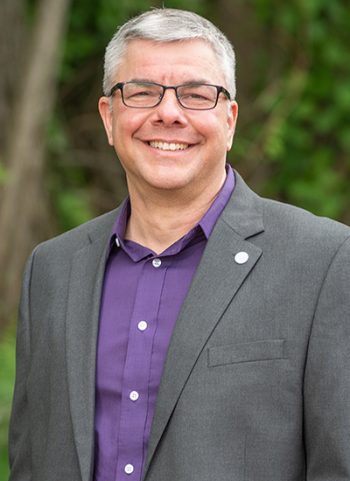
Can you tell me a little bit about yourself, such as where you grew up and your background leading up to joining us at CVN?
I was born and raised in Morristown, New Jersey. I went to high school at Morristown High School and was a spectacularly average or slightly below average student due to different priorities, so I just kind of cruised through high school-I was more interested in other things. But then I joined the army right out of high school in 1987. I served for a little over 21 years, and during this time I deployed to desert storm, that’s how old and dusty I am!
I went to a number of different places; Korea twice, Germany, Greece, Fort Hood Texas, Aberdeen Proving Ground, Maryland, and I did my last 7 years in the Army at Ft. Campbell, Kentucky, and that’s how I ended up here in Tennessee. I also deployed to Iraq 3 times for Operation Iraqi Freedom with the 101st Airborne Division, first for the initial ground Invasion and then for the next two rotations after that. I retired from the army in 2009.
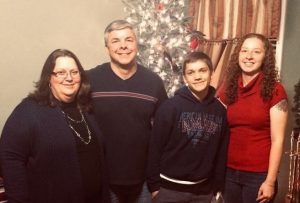
Christmas 2016 (left to right) Joanne, Don, Ian and Angela
A little about my family life – I got married to my wife Joanne in 1996 right before we went to Germany. She had no exposure to the military at all except for me, her grandfather was a pearl harbor survivor and she had some uncles in the navy. Once we got married we went to Germany, then went on to Bosnia for 9 months right away, so she got a crash course in being a military spouse in a foreign country, not knowing anyone and not having a job. She eventually did get a job, made friends, all without me because I was gone; this is really common in military families.
I’ve been married for 22 years now, there’s been lots of ups and downs, but she’s stuck around. Sometimes I wonder how or why when I look back on everything we went through and what I put my family through, it’s really something. My wife is also a licensed social worker. A fun family fact: she is an LMSW and my daughter is an LMSW so it’s a good time around the holiday table, you know. My son is 19 and he has no aspiration of being a social worker and that’s ok with us!
What was it like returning to civilian life?
Overall, my route wasn’t quite that direct. Deploying and returning three times meant every time I came back I brought more emotional baggage that I didn’t know how to deal with. As a platoon sergeant I was supposed to be the fixer, the problem solver, so that just made me cram it down internally even more. I was dealing with a lot of PTSD, survivors guilt, thoughts of suicide, especially towards the end during my last deployment. Eventually, things came to a head and reached a crisis point. I realized that if I didn’t get some help I was going to pretty much lose anything that mattered. So, I got serious about counseling, went to see a social worker, and was going to couples counseling at the time as well. Couples and individual counseling every week was pretty intense; I got help and once things started to fall into place I realized that there’s a lot of brothers and sisters out there struggling like I was, so I felt like I had to do something about it.
After I retired in 2009, I went to school at Austin Peay State University here in Clarksville, Tennessee. I got my Bachelor’s and Master’s in Social Work. While I was in school I became very active with veteran’s issues on campus and off. I helped start up the student veteran’s organization on campus, and I was the first chapter president for about 3 years. I also helped found a nonprofit in Clarksville that offered free counseling to active duty veterans and family members during my first year in undergrad. I worked through, did my masters, and eventually got to where I am today.
It’s incredible that you were able to take your experience and build a career to help others suffering, what was your greatest takeaway from this process?
Counseling was so helpful for me and I’m not sure where I would be without it today. It’s all part of my ongoing journey on the warriors’ path, to consistently check in with myself and figure out what direction I’m supposed to be heading in. I’ve found a little self-disclosure is really helpful to veterans when they first come in, I’m not ashamed to say I had thoughts of suicide or survivors guilt, and PTSD. I share that with my clients and a lot of times their eyes get really wide like “you know exactly what I’m talking about!”. When I share my experience, it can help the clients not have to justify why they feel the way they do or why they react the way they do to things, there’s just that instant understanding that they can be open in here and say what they need to say.
I’m an open book as much as appropriate, I don’t have problems sharing it. I like people to know that right now it feels like you can’t dig yourself out of this hole, but It can be done. It’s not easy, and there is a certain level of “heavy lifting” that needs to be done, but I am here to help them to sort through the issues while walking with them to stay on the path to reach their goals.
Can you tell me about your time spent in the service?
Specifically with the survivors guilt and the things that exacerbated the PTSD, I was exposed to a lot, and had some close calls where I walked away and other people didn’t. Another one of the things that really affected me was during my last tour. I was assigned as the remains recovery NCO in charge for our unit, which is exactly what it sounds like. So I had to deal with recovering remains of people that I had known, some of them I had even just seen an hour or 2 prior to something bad happening, which was pretty much the straw that broke the camel’s back. Having to do that was way outside my scope of experience and training, I was a senior NCO and an older guy so better to have me do it then the younger soldiers was the thought process behind it.
During my mid tour leave during my last tour in Iraq, I distinctly remember one of my low points at home riding around on the mower cutting the grass that was an eighth of an inch high – that was one of the ways I isolated myself from my family. That’s what I did a lot, and one day I was just cruising along in the backyard and a thought just popped into my head that if I killed myself all of this would just stop. I didn’t have this emotional moment or epiphany or anything, it had no impact on me whatsoever, I just felt like ok, that’s an option.
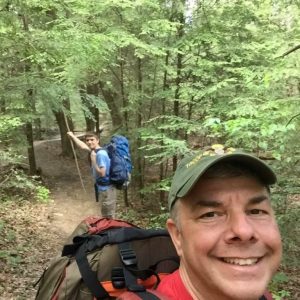 Don with son Ian, backpacking at Savage Gulf State Park, TN May 2017
Don with son Ian, backpacking at Savage Gulf State Park, TN May 2017
Looking back on it, the only thing I think that saved me oddly enough was going back to Iraq because when you’re there you push everything out except for the mission, mission accomplishment. Everything else takes a backseat. When I went back it was all about that, I had grenades and a weapon and plenty of rounds to do what I wanted to do with plenty of time to think about it, but in Iraq I was able to focus on the task at hand and push aside how I was feeling about this. That’s what I think kept me from doing it – just being in Iraq. That’s a scary thought.
What do you like to do for fun?
I love camping, backpacking, spending time in nature- that’s kinda my zen place. I’m an avid backpacker and camper, I love doing it with my son, he really enjoys it too and sometimes I’ll even go off by myself if everyone else is busy – I’ll walk a few miles, put my hammock up, make a cup of tea, take a nap, and just enjoy the time to unwind by myself. That’s my big self-care thing, I also like to go to a native American sweat lodge – there’s a place here in Tennessee outside of Knoxville that has a lot of things going on in regards to Native American spirituality which really interests me.
A sweat lodge is a not quite a tent, but more like a dome where they heat up rocks in a fire then pour water on them so steam fills the space to make you sweat – there are different ceremonies and prayers that happen while you’re in the lodge – but the idea is to create this connection between mother earth, nature and your inner spirituality. It’s a way to cleanse and make that connection with yourself and your surroundings, like a healing ceremony. The one I go to is run by a Vietnam vet, he’s been doing it for about 20 years – he had 10 or 15 years of training with a Native American spiritual healer who’s from Arizona/New Mexico area, so I really enjoy that.
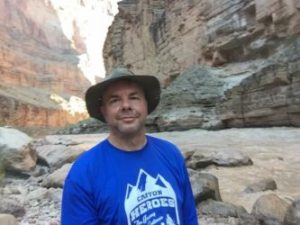 Don whitewater rafting in the Grand Canyon, August 2018
Don whitewater rafting in the Grand Canyon, August 2018
Fun fact about me – I’m a huge fan of the movie The Big Lebowski, I actually attend the yearly Big Lebowski festival in Louisville, Kentucky which is about 3 hours away. My wife has gone with me, I’ve gone with friends, it’s just been a really good time. They have bowling, trivia contests, people dress up as the characters in the movie, and we sit out in this park area where they have a giant projector screen set up so we can watch the movie together.
How have things been going at the Clarksville clinic since the grand opening?
Our soft opening was April 26, so right away we had a surprising amount of people come through the door. It wasn’t as surprising to me because I had done counseling in Clarksville with the VA for a couple of years prior, so I knew the demand, and the desperate need for services here. We knew it was going to be shocking, numbers wise and we knew it was going to be nothing like anything the other clinics experienced before, and its panning out to be that way.
It’s very busy, which is ok because that means people are getting the help they need, they’re willing to come forward and put their faith and trust in us. So, it’s a good thing!
Have you faced any challenges so far in your time at the clinic?
Just the typical challenges you face when trying to help veterans and their family members work through the things they’re trying to work through; we get a lot of support from the network – that’s definitely been a plus – it makes things easier in that there’s always opportunities for professional development and growth which is a big deal for me personally. There is also a big stress on self-care as well, which is also very important to me because if we’re not at our best and can’t be 100%, then that means we can’t be at our best for our clients when they need us the most. I think I appreciate this so much more because this wasn’t always my experience at previous places of employment.
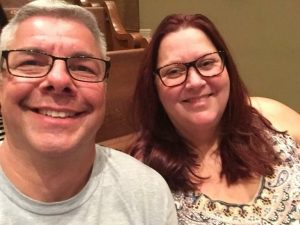 Don with wife Joanne, seeing Anderson Cooper & Andy Cohen at the Ryman Auditorium in Nashville, October 2017
Don with wife Joanne, seeing Anderson Cooper & Andy Cohen at the Ryman Auditorium in Nashville, October 2017
What is your favorite sports team?
I don’t have a favorite sports team actually! I used to watch sports and I used to play sports growing up, but don’t have a specific interest in one sport or one team. I am, however, a football widower as my wife grew up in the Baltimore area – she is a huge Ravens fan! When football season starts I watch with her occasionally but sometimes things get heated in the house during games so I’ll go and give her some elbow room to enjoy the game. She’s very enthusiastic about them to say the least!


